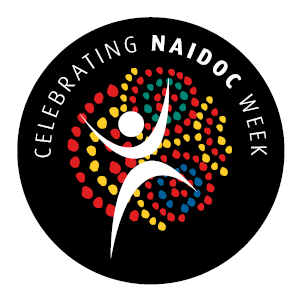The National NAIDOC Awards are announced at a ceremony and ball event in the national focus city. The ceremony is held on the Saturday before the start of NAIDOC Week.
Winner Profiles
2024
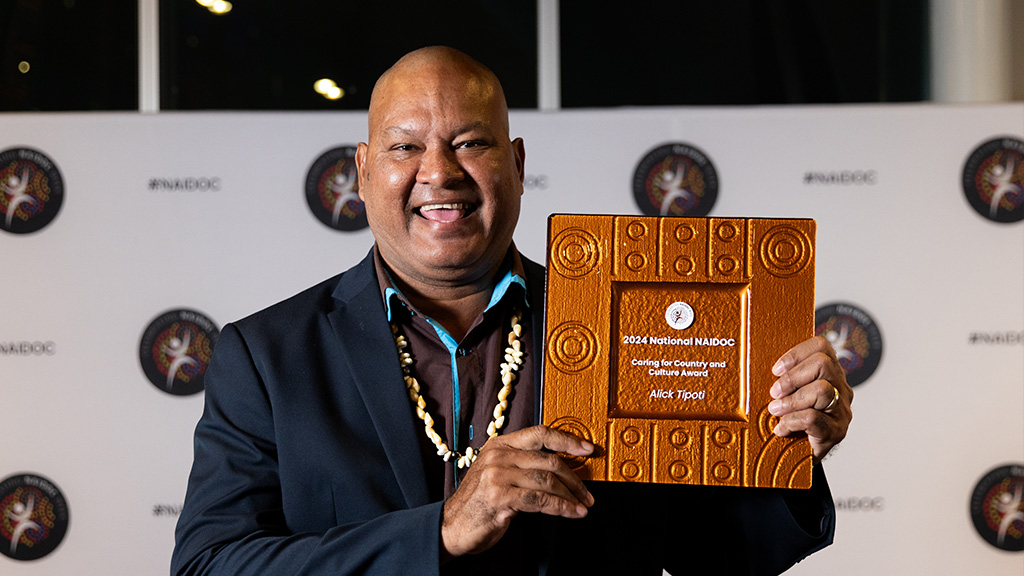
Alick Tipoti
The National NAIDOC Committee are thrilled to announce Alick Tipoti as one of the finalists for Caring for Country and Culture award.
Alick Tipoti is a Koedal (crocodile), a Zugubaw Baydham (seven stars shark constellation and a Kuki Guuba (northwest monsoon wind through his father's side from Badhu. He is a Koedal (crocodile), Thabu (snake) and Dhoeybaw (wild yam) through his mother’s side from Saibai.
He is the head of the Koedal totem through cultural inheritance down the eldest male genealogy line and is known to his people as Zugub meaning spiritual ancestor.
He is a fluent Kala Lagaw Ya language speaker (KLY & KKY dialects), a cultural leader and advisor. Alick is passionate about preserving his native language and reviving cultural traditions through his art and dance, He has been working putting together a language book and aims to have it published by early 2025.
Alick has promoted his culture through art & dance nationally and internally for over 20 years. His artworks are held in major institution collections such as the British Museum, Monaco Oceanographic Museum, Cambridge Museum of Anthropology & Archaeology, National Maritime Museum of Australia, National Art Gallery of Australia and the National Museum of Australia.
Alick has influenced a whole generation of young emerging Torres Strait artists and has significantly revived the art of mask making in the Torres Strait. He believes that art and science are the two most important practices all first nation people should embrace. Art to keep the cultural fire burning and Science to learn about caring for country into the future of global warming and climate change.
His most iconic artwork presentation was when his work was put on the roof top of the Oceanographic Museum of Monaco in 2016. His latest work will be displayed very soon on two Queensland rescue helicopters highlighting environmental themes such as climate change and marine conservation.
Alick brings to life his artwork through cultural Torres Strait songs and dance. the first team he founded (Zugubal Dancers 2012-2016) has performed in many places internationally from the U.K to France to Monaco and throughout the Pacific. His most powerful performance was a traditional ritual in 2015 behind closed doors when the Zugubal dancers performed for Torres Strait turtle shell masks (artefacts) collected in the late nineteenth century and were on display at the Cambridge University/Museum of Anthropology and Archaeology.
In 2021, Alick with his wife and four children established their new dance team called Dhamuw Koedal. in a short time, they have performed in festivals such as the Winds of Zenadth cultural festival (WoZcf23) on Thursday Island, Melanesian Arts & Cultural festival (MACfest23) in Vanuatu, Cook Islands, National Art Gallery of Singapore and Art Gallery of NSW. They have since been booked for a few performance in 2024.
A documentary featuring Alick and HSH Prince Albert II discussing climate change was released in 2020, shedding light on their efforts to care for the environment. This is currently streaming on Stan.
Despite his significant contributions towards caring for country, preservation of language and culture, Alick’s family feels that he is not given the recognition he deserves as a cultural leader and ambassador.
Alick is a very spiritual person and acknowledges that his task as a cultural leader in this life is to continue to collect firwood and placing them in the fire lit by his ancestor and to keep that home cultural fire burning for the next generation of Zenadh Kes Islanders.
Alick believes that, if one wishes to learn their traditional cultural language and is not in a language speaking environment, then one must turn to songs and dance. This will allow them to embrace their culture proper strong especially in the midst of the unknown technology world ahead.
He continues to education the young people to firstly understand their identity by knowing their Totems, Stars, and Winds. From these three elements, they will be more Loud and Proud as a first nation culture.
This is the world of Koey Zugub - Alick Tipoti.
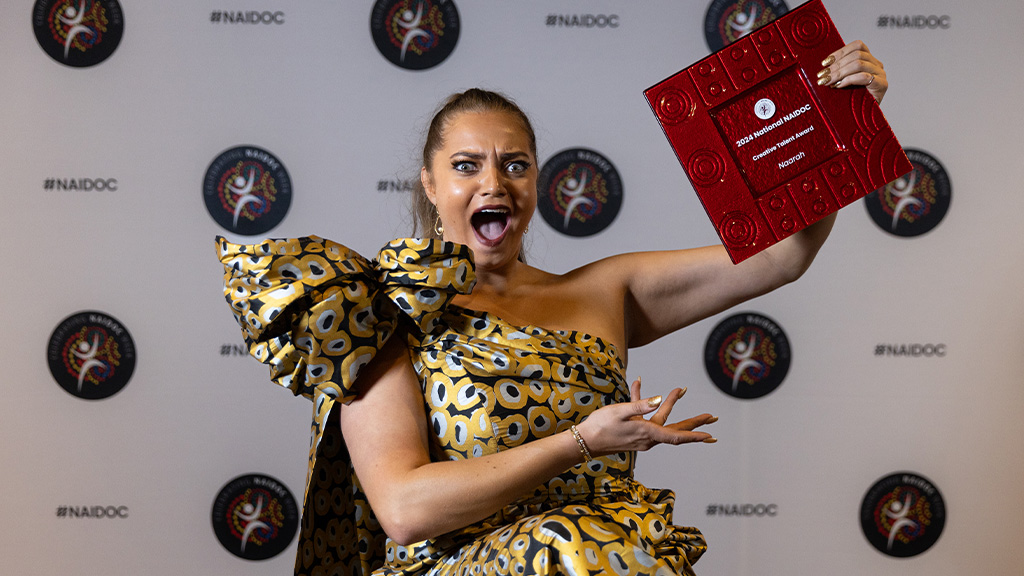
Naarah
Naarah is a Gija woman from the Kimberly who grew up in lutruwita/Tasmania. Naarah is an actor, performer, singer and creative who recently won 2024 Young Australian of the Year in Tasmania.
In 2023 Naarah was successful in her application for a Roberta Sykes Scholarship and Disney Theatrical Scholarship and is now studying a Master of Musical Theatre at the esteemed Royal Academy of Music in London as the first Aboriginal person at the institution.
Naarah uses Instagram and TikTok to spark important conversations about First Nations identity, culture, and representation. She is passionate about changing the entertainment industry and increasing representation in the creative industries, particularly First Nations. She has actively sought to elevate Indigenous representation in the arts by creating opportunities for Indigenous artists and sharing Indigenous stories. Naarah has acted as a mentor for aspiring artists, volunteering to support them in her free time.
Naarah won the 2023 Creative Australia Dreaming Award for the development of her musical theatre project “Broadway but Blak” – a cabaret concert that takes the audience through a journey of musical theatre from a First Nations’ perspective.
Naarah’s future goals are to achieve an outstanding career in screen and theatre, create new works and produce work for young artists, amplify First Nations stories on stages, release an album and be a face for young mob around the country to look up to. Aboriginal and Torres Strait Islander stories, community, songs, theatre and music is at the heart of what Naarah does and why she does it. ‘You can’t be it if you can’t see it’ has always driven her to push and work for change within her industry and she is only just getting started.
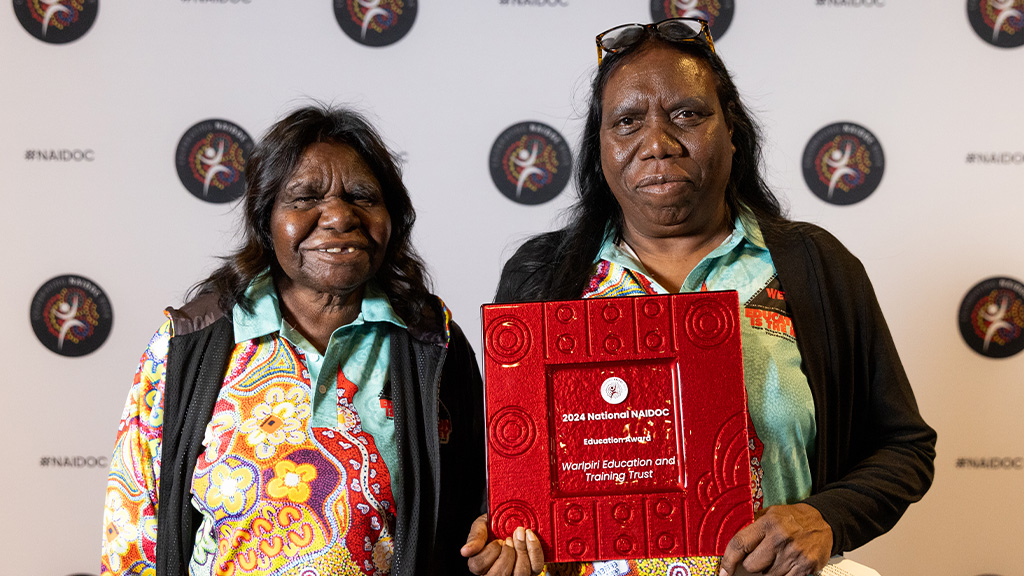
Warlpiri Education and Training Trust
Picture: Masie Kitson Napaljarri and Sharon Anderson Nampijinpa from Warlpiri Education and Training Trust.
Warlpiri teachers and traditional owners of the Newmont Tanami gold mine site set up WETT in 2005 to use royalties from the mine to improve education and training outcomes for yapa (Warlpiri people) in the Tanami Desert. For almost 20 years, WETT has supported a range of partnerships and programs that align with Warlpiri education priorities in Yuendumu, Willowra, Nyirrpi and Lajamanu. So far, WETT has invested more than $53 million to support yapa (Warlpiri people) across its five education program areas:
- Children and families supports Warlpiri governance and staff in early childhood services in Yuendumu and delivers a playgroup in Willowra in partnership with World Vision Australia
- Language and culture in schools supports communities to maintain culture by funding school country visits, Warlpiri language curriculum development and wages for elders to teach in the classroom and on country
- Youth development delivers out-of-school literacy activities for youth in partnership with World Vision Australia and diversionary youth programs through the Central Australia Youth Link Up Service (CAYLUS)
- Secondary school support funds interstate excursions for school students and students away at boarding school
- Learning community centres promote adult learning and literacy for work, life and wellbeing. The centres partner with Batchelor Institute of Indigenous Tertiary Education (BIITE) in Willowra, Nyirrpi and Lajamanu. They serve as classrooms, libraries, internet cafés, cultural archives and service hubs
WETT is a Warlpiri-controlled and governed initiative administered through the Central Land Council (CLC).
The WETT advisory committee comprising four Warlpiri representatives from the four communities, along with one each from Newmont and the CLC, plays a crucial role in designing, planning, and monitoring WETT-funded initiatives. This committee, which meets at least three times a year, advises the directors of the Kurra Aboriginal Corporation, whose members are traditional owners of the mine site. The Kurra directors, guided by this advice, allocate funding to the WETT programs.
Many of the founding members of WETT are still on the WETT advisory committee today and are taking innovative measures to support new and younger members to join the committee and grow into these important roles. WETT's commitment to developing strong governance, careful succession planning, and life-long learning was acknowledged when it received the prestigious Indigenous Governance Award in the non-incorporated category in 2018. In more recent years, WETT has developed an innovative monitoring and evaluation approach, the Yitakimaninjaku, warrirninjaku, payirninjaku manu pina-jarrinjaku (YWPP) ‘Tracking and learning’ program, through which local Warlpiri researches monitor WETT’s programs. The YWPP approach prioritises capturing and amplifying the voices of Warlpiri youth.
WETT’s vision is for Warlpiri people to be strong in their knowledge of culture, country and language, to stand up for Warlpiri communities today and be strong role models for generations to come:
“Our language, culture and decisions will be respected. Our voices will be heard. We will have the same opportunities as everyone else. Our children will be confident, knowledgeable, disciplined, healthy and respected. They will have good roles and jobs, as will the generations to come.”
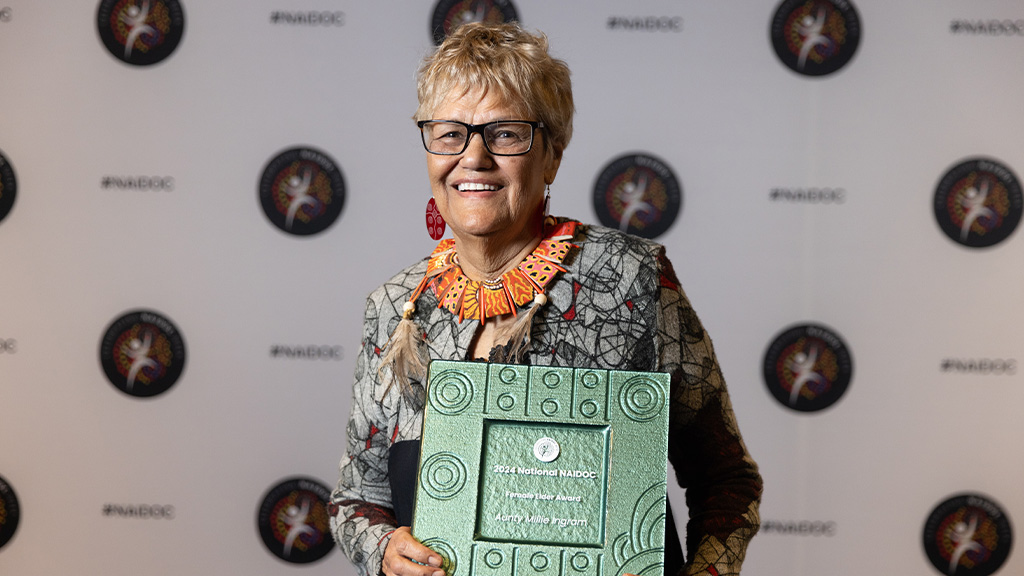
Aunty Millie Ingram
The National NAIDOC Committee are excited to announce Aunty Millie as one of the finalist for Elder award.
Aunty Millie Ingram, a Wiradjuri Elder from Cowra NSW having grown up on Erambie Mission. Moved to Redfern during the 1950s to find work after facing limited opportunities in regional NSW. She began working at a chocolate factory in Redfern, where she also enrolled in night tertiary courses to further her job opportunities.
Aunty Millie worked in community and later joined the Department of Aboriginal Affairs for 13 years, advocating for empowerment and change in areas such as education and land rights. Along with her family, she founded the first Aboriginal Community Controlled early childhood centre, Murawina, and later Wyanga Aboriginal Aged Care program.
Aunty Millie has been a leader in various policy processes and initiatives aimed at supporting Aboriginal communities and self-determination. She played a key role in the inception of the Empowered Communities model, leading to the development of the Jawun program.
Aunty Millie is known for her public engagements, including offering Welcome to Country and speaking at Gough Whitlam's memorial at Sydney Town Hall. At 84 years old, she continues to serve her communities, supporting Elders, youth organisations, and women in business.
A fierce political activist, Aunty Millie campaigned for the YES vote during the referendum and remains dedicated to advancing opportunities for Aboriginal people. She is a living legend who has left a lasting impact on the history of our country.
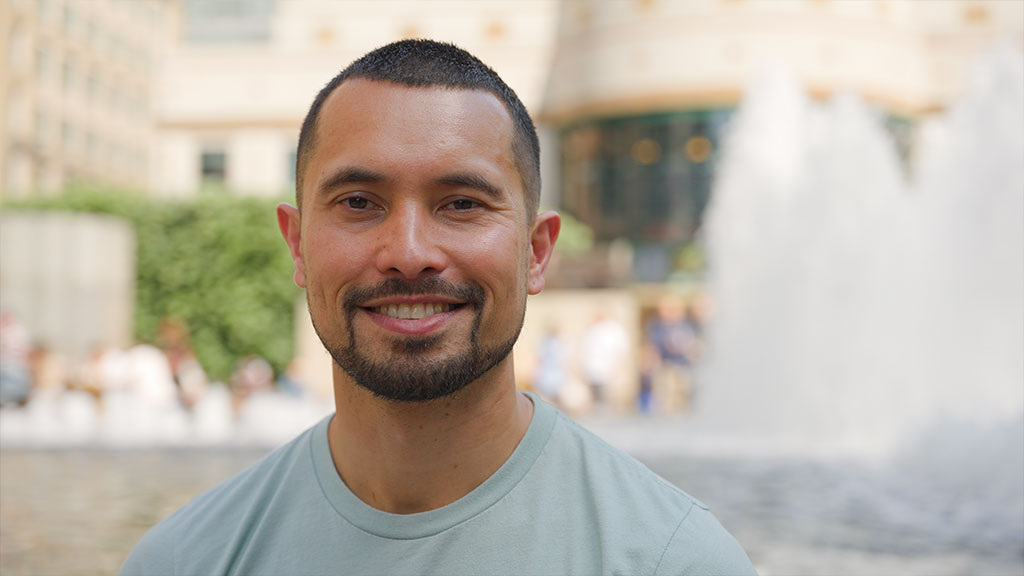
Tui Nolan
A proud Gudjal man, who grew up in Sydney, New South Wales, Tui Nolan has dedicated the past nine years of his career to advancing machine learning models.
Tui completed a Master of Science and a PhD in Statistics at the University of Technology Sydney (UTS). His innovative work in machine-learning has been applied to forecasting housing market trends, predictive economic modelling, improving robotics and satellite data, and enhancing data quality and accuracy.
In 2018, Tui was awarded a Fulbright Future Postdoctoral Scholarship, which enabled him to take on a postdoctoral position at Cornell University in 2019. In 2019 he was also awarded a Roberta Sykes Fellowship.
In 2020, Tui spent three months helping to develop RoboSimian – a limbed robot originally designed to aid recovery operations in disaster zones, but is now being repurposed for space exploration. He was one of the first Australian students to attend NASA’s Jet Propulsion Laboratory under a pilot program to create career pathways for Indigenous science, technology, engineering and maths students.
Most recently, Tui was a research fellow at the University of Cambridge, where he applied his skills in mathematics and his expertise in machine learning and biostatistics to tackle challenging problems relating to COVID-19 and primary immunodeficiency. During this time, Tui worked with a multidisciplinary team of researchers and clinicians to develop and implement data science algorithms that identified the major genetic factors contributing to the severity and recovery from the pandemic, as well as the extreme causes of primary immunodeficiency.
Tui has mentored Aboriginal and Torres Strait Islander students as they transition to university through the Jumbunna Institute for Indigenous Education and Research, the Aboriginal Summer School for Excellence in Technology and Science, Aurora Education Outreach, and the Galuwa Science Experience at UTS.
Tui is currently focusing on diabetes, through his work at Abbott, an international pharmaceutical company, where he is monitoring the accuracy of glucose measurements from a new blood measurement technology that does not require a finger-prick test from diabetes patients. Through his work, Tui is helping people with diabetes to live happier, healthier lives.
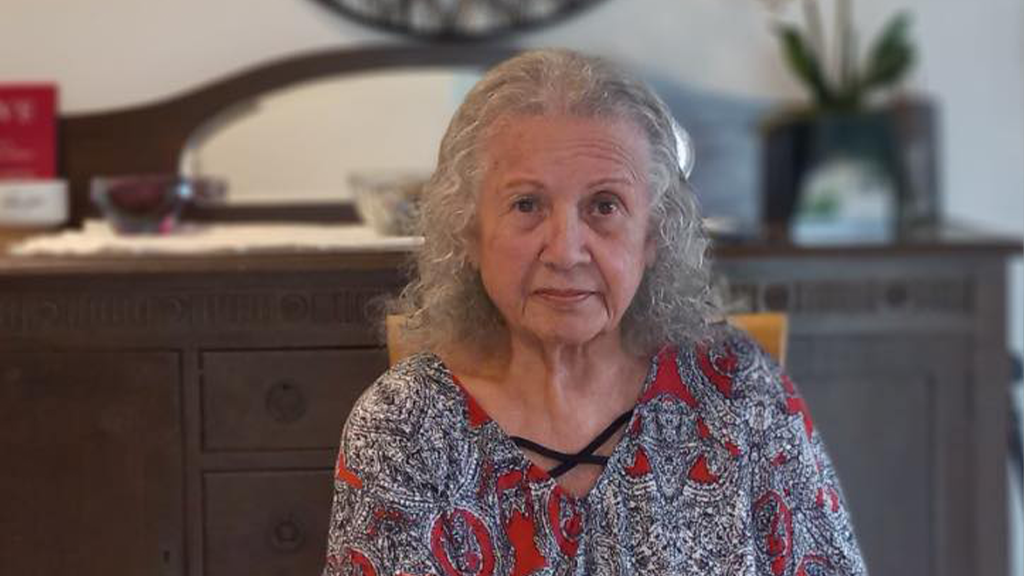
Aunty Dulcie Flower AM
Aunty Dulcie Flower AM was born in Cairns in 1938. Aunty Dulcie’s mother was of the Meriam People of Torres Strait. Aunty Dulcie has left an indelible mark on Australian history through her unwavering dedication to activism, advocacy, and community development.
Aunty Dulcie’s Grandfather was born on Mer (Murray Island) with the family later moving to Erub (Darnley Island). Aunty Dulcie has fond memories of growing up as part of the Torres Strait Community in Cairns and enjoyed the regions multicultural atmosphere. Aunty Dulcie recalls the vibrant pearl and trochus shell industries in Cairns during her youth and how these industries, and those that worked in them, touched the lives of her family.
As the oldest in her family, Aunty Dulcie left school early to join the workforce. Whilst employed in her first role at a timber mill, Aunty Dulcie attended night school, eventually moving into office work and later becoming a registered nurse. Aunty Dulcie relocated to Sydney to advance her career by studying midwifery and working for several years as an operating room nurse.
During this time, Aunty Dulcie was invited by her Aboriginal colleagues to meet community members, leading her to join the Aborigines Progressive Association, led at the time by the late Elder Bert Groves. This led to the Federal Council for the Advancement of Aborigines and Torres Strait Islanders (FCAATSI), for which Aunty Dulcie served as Conference Delegate and eventually General Secretary.
FCAATSI had a broad, progressive focus, campaigning for improved outcomes for First Nations peoples in regard to cultural recognition, industrial equality, health, legal protections, education, housing, clean water, proper waste disposal, and land ownership. FCAATSI fought to end racism and discriminatory legislation, and fought for self-determination. Notably, FCAATSI campaigned for change to the Commonwealth Constitution in 1967, resulting in a successful referendum that recognised First Nations people’s constitutional right to vote and to the provision of Commonwealth Services. This meant that for the first time Aboriginal and Torres Strait Island peoples had the “right to choose”.
Aunty Dulcie was later invited by members of the Redfern community to participate in the planning of a community medical clinic. In collaboration with her community, South Sydney Community Aid, and doctors from Prince Wales Hospital, Aunty Dulcie helped to establish the Aboriginal Medical Service Co-operative (AMS Redfern), a vital community service. Aunty Dulcie has dedicated many years to AMS Redfern, acting as a foundation member and a volunteer, before eventually being elected Director of the AMS Redfern board, a role she continue to hold today. Aunty Dulcie has represented AMS Redfern on panels discussing health issues at all levels. Aunty Dulcie recognises her work with AMS Redfern has having inspired her later work as a Community Educator and a Health Worker Education Program Co-ordinator.
Aunty Dulcie has since connected with international organisations like the World Health Organisation (WHO) and the United Nations (UN). In attending the WHO’s workshop on Globalisation and Diabetes at Yale University, Aunty Dulcie was able to discuss health issues with a team of researchers from Sub-Saharan Nations, Vietnam, Mexico, USA, and Australia. Aunty Dulcie acted as a delegate for the UN’s End of Decade International Women’s Conference in Kenya.
Aunty Dulcie has acted in several high profile roles, including her appointment to the Torres Strait Advisory Board of ATSIC, as Regional Councillor of Sydney Regional Council, as a member of the NSW Torres Strait Islander Organisation, and as a member of the inaugural Board of Bangarra.
Throughout her career Aunty Dulcie has maintained a connection to her roots in health care and has been a member of Carers New South Wales, an honorary Fellow of the Australian College of Nursing and a foundation member of the Congress of Aboriginal and Torres Strait Island Nurses and Midwives. Aunty Dulcie is currently involved in a research project on Aboriginal Women Activists in Redfern.
Aunty Dulcie Flower’s contributions have been recognised on a national scale, culminating in her appointment as a Member of the Order of Australia (AM) in 2019 for her significant service to the Indigenous community and her pivotal role in the 1967 Referendum Campaign.
Amongst her many achievements, Aunty Dulcie recognises the importance of her family. Aunty Dulcie has two children, 5 grandchildren and 5 great grandchildren, who she couldn’t be prouder of. Aunty Dulcie also acknowledges the people who have impacted her throughout her journey, stating:
“So I have met the most amazing people, mentored by the late, with respect, Faith Bandler, Pastor Doug Nicholls, Joe McGinness, Bert Groves, PeRl Gibbs, Aunt Geraldine Briggs, Gladys Elphick, Winnie Branson, and with colleagues including Joyce Clague, Evelyn Scott, Bruce MacGuiness, Ken Brindle, Isobel Kent, Sally Goold, Ray Peckham, Naomi Mayers and Sol Bellear.
My Torres Strait family has also mentored me and I am blessed to have the privilege of working with Aboriginal People and also with Torres Strait Islanders to gain justice and equality in this country. An important aspect has been encouraging non-Aboriginal students and professionals to work with our peoples not for them, in the ongoing struggles to achieve equality in access to the necessities of life, cultural acknowledgement and respect, freedom from racism, optimum standards of housing, health, education, clean water supply, and land ownership.”
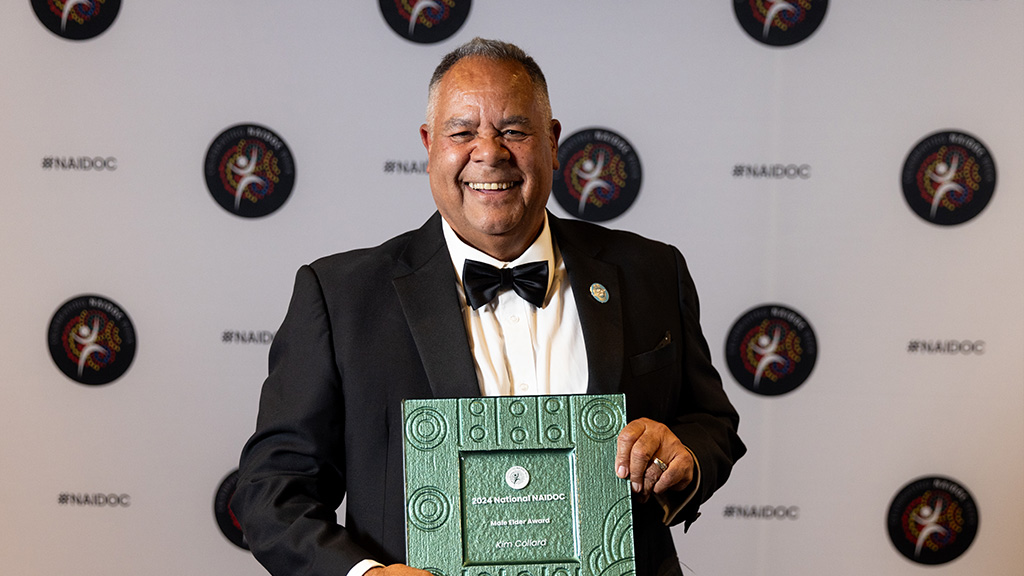
Mr Kim Collard – Balladong/Wadjuk Elder of the Noongar Nation
Mr Kim Collard – Balladong/Wadjuk Elder of the Noongar Nation has had a significant impact on indigenous communities and wider Western Australian society alike. Throughout the years, Kim has devoted himself to his professional and philanthropic endeavours, touching the lives of many in the process.
After working as a boilermaker, then as a Western Australia police officer, Kim joined academia and spent 10 years at Curtin University. Kim went on to establish two of Australia's largest Indigenous-owned businesses, Kulbardi and Kooya Australia Fleet Services, which have flourished commercially for the past decade. Through his businesses, Kulbardi and Kooya, Kim has created job opportunities for both Aboriginal and non-Aboriginal people.
In addition to these impressive academic and entrepreneurial feats, Kim has always been committed to giving back to the community. In 2014 Kim founded The Bibbulmun Fund, a unique Indigenous-led philanthropic initiative designed to facilitate positive change by Aboriginal people, for Aboriginal people. The Bibbulmun Fund has raised over $1.4 million, supporting 19 charitable organisations across Australia, focusing on Aboriginal education, leadership, entrepreneurship, work readiness programs, youth diversionary programs, elder's camps, disaster relief, and programs encouraging Aboriginal self-determination.
Mr Kim Collard – Balladong/Wadjuk Elder of the Noongar Nation is an inspiration to his community, whose work is instrumental in providing opportunities for First Nations peoples to uplift themselves and their communities.
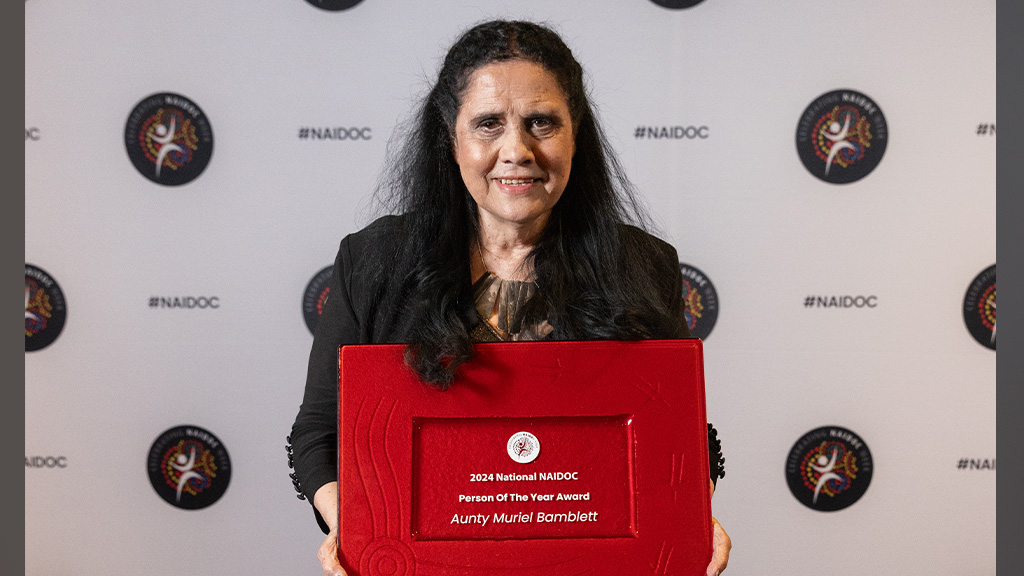
Aunty Muriel Bamblett
The National NAIDOC committee are thrilled to announce Aunty Muriel Bamblett as a finalist for the Person Award category.
Aunty Muriel Bamblett is a proud Yorta Yorta, Dja Dja Wurrung, Taungurung, Boon Wurrung Elder.
As CEO of the Victorian Aboriginal Child Care Agency (VACCA) since 1999, Aunty Muriel has advocated and advanced the interests of Aboriginal children and families, and has embedded culture in everything VACCA does to build resilience, self esteem, connection and belonging.
Aunty Muriel has expanded the breadth and depth of services for Aboriginal children and young people in need. The organisation has grown significantly since 1999 with over 1000 employees and over 80 programs and is the leading one of its type in Australia.
Under Aunty Muriel’s leadership, VACCA has advocated strongly for the right of Aboriginal children to be raised in his/her own culture and the importance and value of family, extended family, kinship networks, culture and community in raising or ‘growing up’ Aboriginal children.
Aunty Muriel’s impactful leadership has led to significant policy and legislative reforms. She has lobbied successfully for major changes to Victorian laws so that it now includes - recognition of connection to culture and community as critical for the best interests of Aboriginal children; decision making processes for Aboriginal children which include self-determination and the Aboriginal child placement principle; and the requirement for cultural support plans for Aboriginal children in out-of-home care.
Aunty Muriel pushed for the culmination of the Section 18 Aboriginal Children in Aboriginal Care Program, which enables the Principal Officer of VACCA (CEO) to perform functions and powers of the Secretary for authorised children. It is due to Aunty Muriel’s drive that Aboriginal Children in Aboriginal Care (Nugel) has been such a success and is the first time in Australia that State power has been transferred back to the Aboriginal community. As the child’s ‘Aboriginal guardian’ Aunty Muriel is involved with the child and makes sure they are connected to their culture, community and country, that they have strong Aboriginal role models, that they are proud and strong in their Aboriginal identity and that they know their family, their parents, their siblings and their kin, as culture starts with family, community and connection.
Aunty Muriel is a strong advocate for voice for her community and never sways in her commitment to improve outcomes for children and families. As Chairperson of the Secretariat of National Aboriginal and Islander Child Care (SNAICC), the peak Australian agency for Indigenous child and family services, she has championed new approaches to federal engagement in the Aboriginal children’s agenda and supported Aboriginal communities across the country to develop and deliver innovative and effective child and family support policies and programs. Under her visionary leadership more and more Aboriginal communities picked up the challenging task of trying to ensure that their children and grandchildren were able to grow up safe, proud, confident Aboriginal people.
Aunty Muriel is actively involved on numerous State and National committees including the:
- Coalition of Peaks Joint Council on Closing the Gap,
- National Aboriginal and Torres Strait Islander Family Safety Committee,
- Aboriginal Justice Forum,
- Aboriginal Children’s Forum
- Elders Voice Standing Group for the First Nations Treaty Assembly
- National Aboriginal and Torres Strait Islander Family and Sexual Violence Advisory Group
- Aboriginal Community Elders Service, to name a few.
Recognized for her significant contributions, Aunty Muriel received the Officer of the Order of Australia (AO) in 2019 for distinguished service to the Indigenous community in Victoria as an advocate for the self-determination and cultural rights of children.
Aunty Muriel has been inducted into the Victorian Indigenous Honour Roll and the Victorian Honour Roll of Women and received the Women’s Electoral Lobby Inaugural Vida Goldstein Award.
Academic institutions have also recognised Aunty Muriel’s work. In 2009 La Trobe University’s Faculty of Health Sciences appointed Aunty Muriel as an Adjunct Professor in the School of Social Work and Social Policy. In 2017 the University of Sydney awarded Aunty Muriel the Doctor of Letters in Social Work, honouring her leadership in Indigenous welfare and affairs. The award recognised her efforts to bring about welfare legislation in Victoria with a fundamental commitment to the rights of Aboriginal and Torres Strait Islander children, to their families, community, culture, and identity.
Aunty Muriel is an inspiring person, truly committed to the welfare of Aboriginal people. Through her tireless efforts, she is shaping a brighter future for Aboriginal families in Victoria, inspiring the next generation of proud, strong leaders to continue the legacy of advocacy and empowerment.
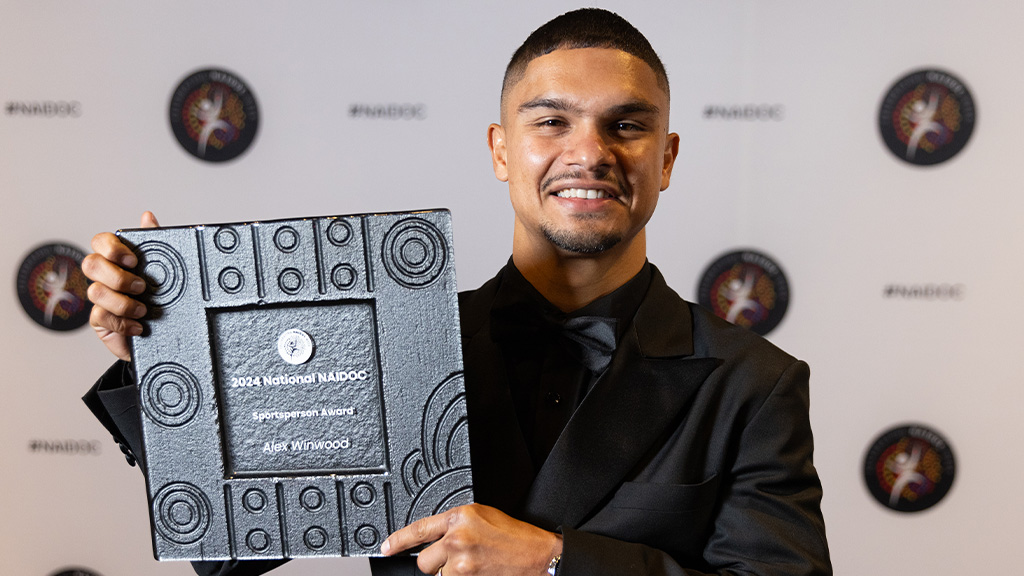
Alex Winwood
Mr Alex Winwood is a proud Noongar man, born in Bunbury Western Australia. Alex is a world class boxer, having ranked high in several international boxing championships throughout his career.
Starting in 2013, Alex’s has already had several impressive highlights in his boxing career. Alex participated in the 2020 Olympic Games in Tokyo, the 2022 Commonwealth Games in Birmingham, and in multiple world championships. Alex is currently ranked 2nd in the world by the World Boxing Council, 5th by the International Boxing Federation, and 8th by the World Boxing Organisation. Alex is positioned to become the fastest Australian man to achieve the title of World Champion.
As well as being an exemplary sportsperson, Alex has become a role model for his community, often working with local schools to inspire students to pursue their interests. Alex’s deep connection to culture and pride in his heritage is communicated in everything he does.
Alex is an ambitious, high-achieving person who is a pride to his community.
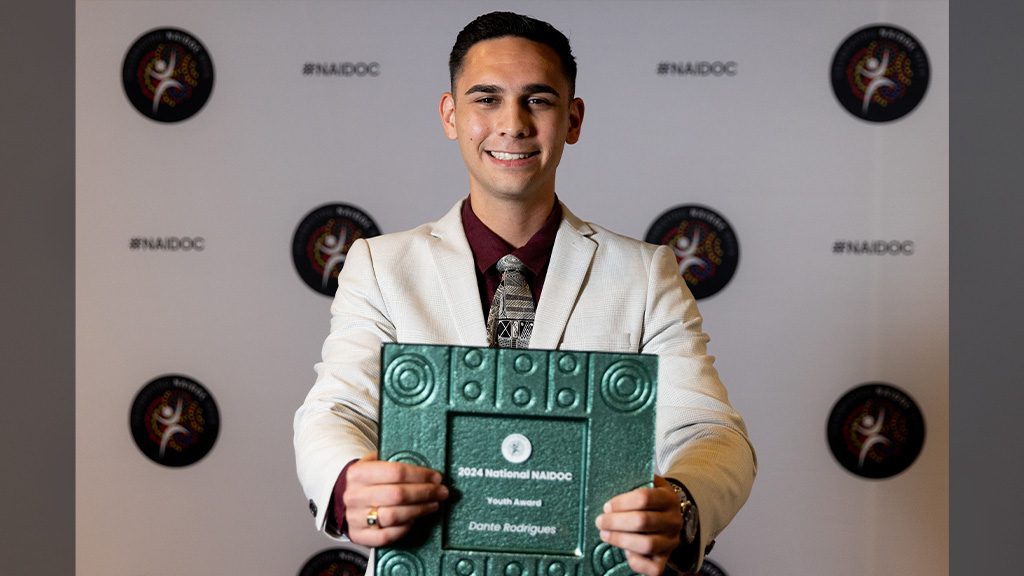
Dante Rodrigues
The National NAIDOC Committee are thrilled to announce Mr Dante Rodrigues as a finalist for the Youth Award category.
Dante Rodrigues is a professional fighter with an impressive background, boasting titles in various martial art disciplines. A proud descendant of Tiwi Islander with a mix of Timorese, and Portuguese heritage. Dante started fighting since age 12 and has been competing against adults proferssionally since he was 14. He has claimed multiple state and Australian titles in Muay Thai and K1.
Dante was the first aboriginal kickboxer and territorian to represent Australia at an Olympic level and even winning a silver medal for Asutralia in the Junior World Kickboxing Championships in Italy. Dante Represented Australia for a second time in 2023 where he made it to the quarter finals in the World Kickboxing Championships in Portugal.
When not preparing for fights, Dante is an advocate for mental health awareness and runs health and wellbeing programs for the youth in Northern Territory through "One Percent Better Communities," a business he co-founded with his cousin, Jahdai Vigona. A role model in the NT, Dante received the NT NAIDOC youth of the year award in July 2023.
